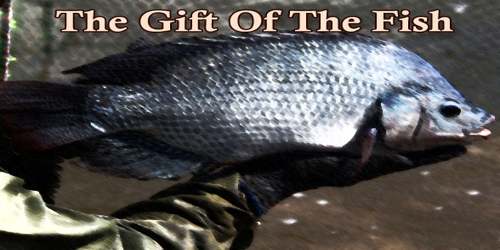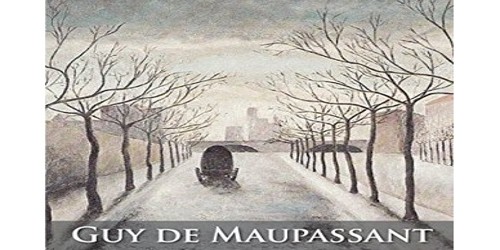Thabiso and her husband lived near the banks of a river. They were poor but happy, and they spent their days planting their fields and tending their crops.
One day Thabiso stood in the fields, her child strapped to her back. The sun was high and hot, and so she made a tent of goatskin and sticks, and lay her son, Mahwi, inside while she worked. Mahwi fell into a deep sleep.
Soon after, a large seagull passed overhead. “What’s that?” the seagull wondered, and he flew to the tent and peered inside. “What a fat morsel this is. I’ll take it home for supper.” He picked up Mahwi in his beak and flew toward his nest.
The baby awoke as they flew. Seeing the ground so far below, he began to wail. The bird, terrified by the sound, swiftly flew back to the riverbank and left the baby there.
At dusk, Thabiso finished her work and walked to the tent. Alas, she wailed. Her child was gone.
Mahwi, meanwhile, lay helpless upon the riverbank. Suddenly a huge fish swimming past heard the baby’s cries, and he swam to shore. “Come,” said the fish, “I will take you home to your parents.” The fish opened its huge mouth and swallowed the boy, and swam toward the parents’ home.
Swimming upstream, the fish approached the bank near where Thabiso and her husband lived. The fish raised his head out of the water and sang: “I carry a baby boy. One day he will be rich, but he must learn to cherish his gifts.” Then he opened his mouth wide and set the child upon the shore.
Thabiso came running to her baby and lifted him in her arms. She called to the fish. “Wait, I must reward you.”
“No,” said the fish, “I saved your child, though I know you are poor. All I ask is that you teach your child well.”
But Thabiso and her husband did not heed the fish’s words. They were so grateful for their son’s survival, they began to spoil him, and their generosity made Mahwi lazy. When he was old enough to work, he refused. Even when his father died, he would not work.
At last Thabiso turned to her brother for help. “I have ruined my son,” she said sadly. “In giving him all he wished, I have taught him to be selfish and lazy. Please, won’t you help me to teach him?”
Thabiso’s brother took Mahwi away. Together they climbed a steep mountain. “You will learn to struggle,” Mahwi’s uncle said as they trudged uphill.
They followed a ragged path on a long and difficult climb, and at last they reached the top. There, before them, stood a huge boulder with many figures carved upon it. The uncle took a bracelet of grass from his arm and placed this on his nephew’s arm.
Then the boulder moved aside and Mahwi saw a huge, gaping hole.
“Now, nephew,” said his uncle, “This is your ancestors’ wish for you. Climb into this cave and use your wits. You must turn up each of the pots you find inside, and you will struggle. But remember that you are blessed. Call on your blessings when you are in need, and know that this bracelet is the reminder of all of them.”
Then the uncle went away.
Mahwi was terrified, but he entered the dark cavern. He reached for the first pot. It was heavy, and he struggled to lift and turn it. At last he managed to turn the pot upright, and when he did, dozens of chicks and hens ran out. But then came a fierce black dog who ran at him.
Mahwi screamed in terror, but remembering his uncle’s words, he called upon his blessings, rubbing the bracelet as he did. The power of Mahwi’s ancestors embraced him and the vicious dog vanished.
“I am saved,” Mahwi said. “I am saved by the kindness and generosity of my ancestors.”
He turned to the second pot. This time he had to use every ounce of his strength to turn the pot, but when he did, he heard the clatter of hooves and out scampered a flock of sheep, bleating with joy. But then again came a savage dog who rushed to attack the boy.
Mahwi again rubbed his bracelet, and again the dog vanished.
Now Mahwi knew that he had much to remember. He knew he must, from that day on, work hard and give thanks for his blessings.
He reached for the third pot and struggled with all his might to turn it. When he did, a herd of cattle jumped to their freedom. And then out came the most savage dog imaginable.
This time, in his terror, Mahwi nearly forgot his bracelet, and he fought against the dog. Just as he was losing hope, he rubbed his bracelet, and the dog vanished.
Mahwi looked with pride and gratitude at his possessions, but he wondered how he would escape this underground world with his belongings. He rubbed his bracelet, and the sheep, cattle, and hens and chicks all scrambled back into their pots. But now the pots were light, and Mahwi carried them out into the light.
With the largest pot balanced safely on his head, and the smaller fit under each arm, he struggled down the steep cliff. Reaching home at last, he stood before his mother and said, “I bring you riches for the love you have always given me.” He rubbed his bracelet, and all the animals leaped from their pots.
“I want to share my wealth with all the village,” Mahwi told his mother, and she agreed. They called to all the villagers to celebrate, and the people danced and sang all night long.
In the midst of the celebrations, Thabiso dipped her gourd into the river to draw water. As she did, the fish rose up. “I have come for my reward,” the fish said. “I want your son to remember, always, his debt to you and his ancestors.”
Mahwi did remember, and because of this, and because he had learned to work hard and to feel gratitude, he was rewarded with a long, happy and productive life.
















